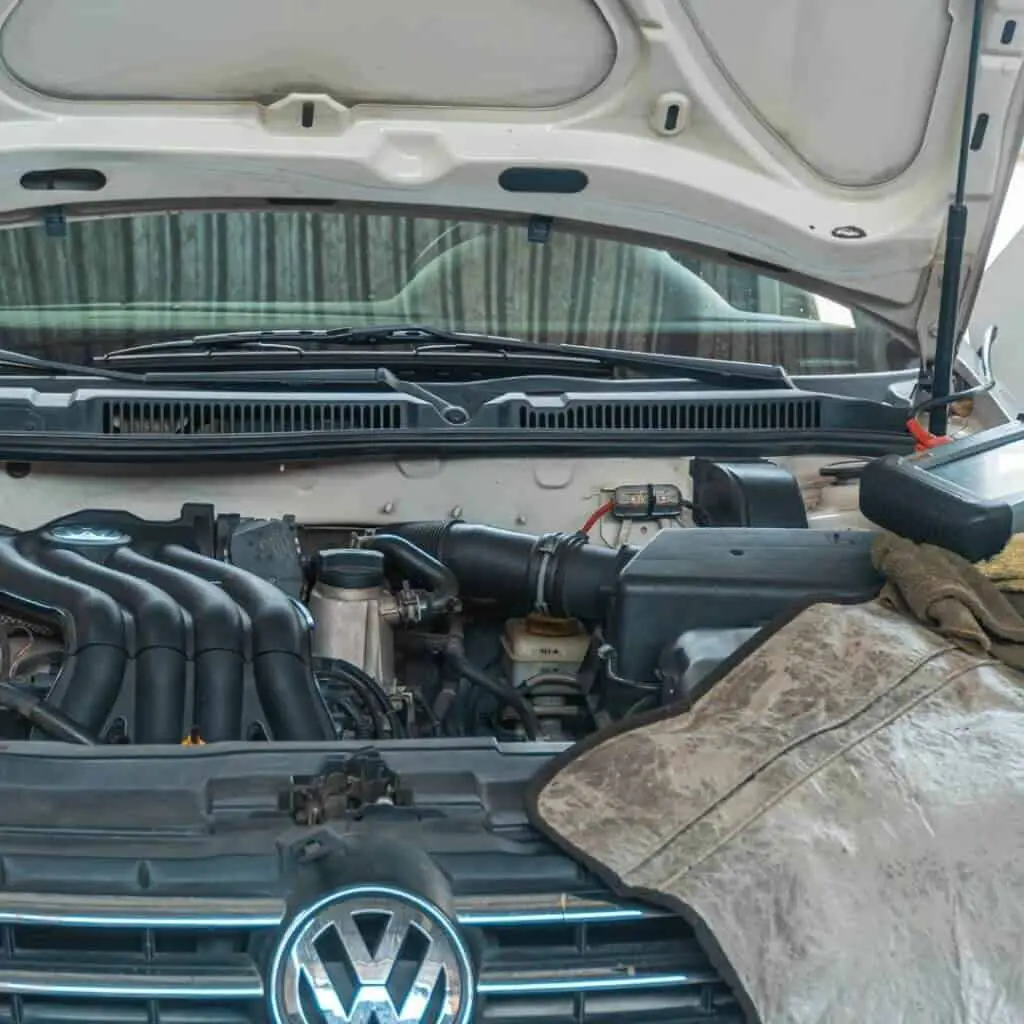The B47 is a diesel engine introduced by BMW in 2007. Compared to its predecessors, the engine is designed for improved efficiency, performance, and reduced emissions. It is a four-cylinder engine and often features a single turbocharger or a twin-scroll turbocharger (depending on the model) to improve power output and efficiency.
The BMW B47 engine is designed as an inline-4 with a variable geometry turbocharger in some versions and a sequential twin-turbo in others. Unlike the preceding non-common rail injection M47, B47 uses common rail direct injection. This feature aids in delivering suitable amounts of fuel directly into the combustion chamber.
Common BMW B47 engine problems

B Series engines mainly experience timing chain problems, EGR sensors, and intake manifold swirl flap issues, among others. The problems usually result in high repair costs after around the 30,000-mile mark. We’ll detail each of the B47 engine issues and offer workable solutions in this article.
- Timing Chain Problems
The B47 engine is prone to early timing chain failure. It can malfunction from 40,000 to 100,000 miles, triggering catastrophic engine failure as its components lose synchronization.
Strange noises from the engine compartment are signs of the timing chain experiencing some problems. First, you will hear a minimal grinding noise in the motor. The grinding will subsequently become louder [2].
Other signs may include engine misfires, metal debris or shavings in oil, and diminished power and performance. Engine overheating, reduced fuel efficiency, and stalling or starting difficulties have also been reported after timing chain failure.
The exact cause of this problem is yet to be discovered. However, a design flaw in terms of material defect, a wrong diameter of the gears, the guide rails, or excessive chain slack seem to be probable causes.
The oil change interval can also play a role. Regular oil changes with high-quality and prescribed oil is recommended for the BMW B47 engine.
The typical process of repairing the broken timing chain includes replacing the timing chain and the associated components. These include the oil pump chain and the guide rails, as well as the gears, tensioners, and all the seals that go with them.
Replacement of damaged valves, the valve cover, and the head gasket is also carried out. During this process, ensure you only use original BMW spare parts.
- DPF Concerns
Another prevalent problem with this engine is when the diesel particulate filter (DPF) ends up clogged. DPF is required in all contemporary diesel engines and functions similarly to a catalytic converter. The DPF neutralizes harmful gases and prevents their escape into the atmosphere.
The DPF is easily clogged. Many individuals drive their cars for short distances, which limits DPF regeneration. Eventually, the DPF will get entirely blocked, and you will have difficulty starting the car [3].
To avoid this issue, drive your car on the highway every now and again. This will allow the DPF to renew and prevent clogging.
Defective EGR valves also cause DPF problems. The EGR valves are designed to reduce unfavorable emissions by redirecting unused exhaust gases from a diesel engine. If an EGR valve fails, it will increase the amount of particulate matter produced by the engine. This causes the DPF to clog faster than usual.
Defective fuel injectors may also result in DPF experiencing certain issues. Anything that disturbs the delicate mixture of air and fuel causes the diesel engine to emit more soot than it already does.
A turbocharger can also leak large amounts of oil into the fuel system, causing the DPF to drown in a sea of engine oil. The only way around this would be to remove and clean the DPF manually. DPF cleaning is available through specialized services.
- Turbocharger Failure
The B47 is a four-cylinder engine with a single turbocharger or a twin-scroll turbocharger (depending on the model) to boost power and efficiency. Turbocharger failure is a common but avoidable issue. Turbocharger faults can be disastrous. Thus, they must be addressed as soon as they appear.
The most common cause of turbocharger failure is oil-related. Shortage of oil or filthy oil are the most prevalent reasons for turbocharger malfunction [4].
Long oil service intervals are the leading cause of turbocharger failures with most BMWs. The dealer suggests typical oil changes every 12,000-18,000 miles.
There are several additional reasons why your turbocharger may fail, such as foreign objects/deposits. Foreign materials such as dust particles, dirt, leaves, and small stones may enter the turbo through the compressor or turbine inlets. If foreign items begin to harm the compressor wheels or turbine blades, the turbo’s efficiency will decrease.
Though turbos are intended to last the vehicle’s life, they may wear out over time, resulting in turbo issues. To prevent these issues, regularly maintain and replace your air filter and check your turbo for debris.
Another common issue with turbochargers is a malfunctioning turbo actuator. The turbo actuators on the B47 engine can fail. When the actuator fails, you will notice a decrease in engine power. Leaving the car to cool down for 15 minutes solves the problem momentarily, but it will return after a while.
This problem can only be solved by purchasing a rebuilt or completely new actuator. Common symptoms to identify a failing turbo actuator may include power loss, whining engine, exhaust smoke, and the Check Engine lamp illuminating.
- Failure of the Intake Manifold Swirl Flap
Failure of the intake swirl flaps is another fairly common issue with this engine. Diesel engines lack throttle bodies and rely on swirl flaps to admit air into the intake manifold [5].
These flaps are positioned on the intake manifold and open and close whenever they are required.
Swirl flaps can become blocked and cease to function. Carbon deposits adhere to these flaps, preventing them from properly opening and shutting. When the flaps fail, you will notice problems with power delivery, and the engine will run poorly.
Most car owners resort to removing them in an attempt to solve the problem.
However, this is not advised because the engine performance would suffer. The low-end torque of diesel engines is lost, and the automobile seems sluggish and reluctant to respond.
Furthermore, the MPG will be reduced by at least 5 MPG. So, instead of eliminating the swirl flaps, you are encouraged to clean and try to repair them.
- EGR Valve and Sensor Issues
EGR valve issues are widespread among BMW B Series diesel engines. The EGR valve (gas-recirculating valve) feeds part of the exhaust gases into the intake, where they are burned, and the pollutants are reduced.
Earlier versions of the B47 engine used a fully pneumatic EGR valve with a simple operation.
However, modern engine types have an electronic EGR valve with a sensor that activates and deactivates the valve. The principle function of the exhaust gas recirculation system involves reducing nitrogen oxide levels [6].
A common source of EGR failure is faulty temperature sensors, clogged EGR Pipes, and sticky EGR valves. The same contaminants, including particles, carbon deposits, and dirt from fuel, can clog up your EGR pipe. It also accumulates on the valve itself, causing the EGR valves to become stuck.
Symptoms of EGR valve failure are the Check Engine light and drivability and performance issues. This is because a defective EGR valve disrupts the flow and operation of the EGR system. As a result, you will encounter performance concerns like reduced power and acceleration, and poor fuel efficiency.
List of Bmw’s and Mini Vehicles with b47 engine:
- BMW 316d
- BMW 218d
- BMW 318d
- BMW 418d
- MINI Cooper SD
- BMW 120d
- BMW 220d
- BMW 320d
- BMW 125d
- BMW 225d
- BMW X1 sDrive25d
- BMW X5 sDrive25d
Related: BMW N47 Problems
Conclusion
Despite the BMW B47 engine problems, like timing chain issues, DPF, and EGR concerns, overall the engine is still reliable. However, the timing chain can be a deal breaker for some. If you wish to avoid this severe issue, we suggest purchasing a newer version of the engine B47.
All in all, regular maintenance, such as prompt oil changes and safe driving practices, helps reduce some of these issues. When problems occur, you should deal with them immediately to prevent more severe damage and expensive repairs.
Read Next: BMW 435d Problems




